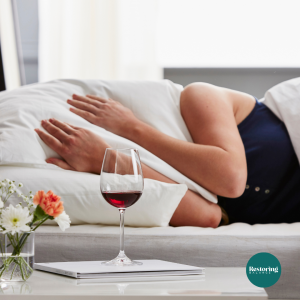Let’s face it, ladies, the joys of peri-menopause and menopause can be a bit of a rollercoaster. Hot flashes interrupting your best power suit moment? Check. Sleep that feels more like a nap war with a toddler? Absolutely. And for many of us, a cheeky glass of wine might seem like a welcome friend to help us unwind after a long day. But what if that glass of Merlot is actually making things worse?
The truth is, alcohol can have a bit of a double-edged sword effect on our bodies during this hormonal shift. While it might offer a temporary sense of relaxation, it can also exacerbate some of those pesky symptoms we’d rather ditch. So, let’s delve into the not-so-secret relationship between alcohol and menopause, and explore some tips for navigating this time with a bit more comfort.

The Hot Flash Flashpoint
One of the most common complaints during menopause is hot flashes. Those sudden surges of heat that leave you feeling like you’ve just stepped out of the oven? Not exactly ideal. Unfortunately, research suggests that alcohol can actually be a trigger for these fiery episodes. A study published in the British Journal of Medicine found a link between alcohol consumption and increased hot flashes.
Sleepless in Seattle (or Winchester)
If you’re already struggling to catch those elusive Zzz’s thanks to night sweats, alcohol might not be your best friend. While it can initially make you feel drowsy, alcohol disrupts your sleep cycle later in the night, leading to fragmented sleep and leaving you feeling more tired in the morning.

Histamine intolerance or the itches
The various chemicals that form an integral part of nearly all our of alcoholic drinks make them high in histamines, think sulphites, most of you know this means only one thing, yes, that’s it the itches, hives, and rashes. Depending on where you are in your cycle and what your preferred tipple is, you can react differently.
I need to go again (& I’ve only just been)
Alcohol can affect our bladder leading to night time waking to go to the loo but for some, it can trigger a form of cystitis.
Bone Basics
As women go through menopause, our oestrogen levels naturally decline. This can lead to a decrease in bone density and an increased risk of osteoporosis. Here’s where alcohol throws another curveball. Heavy drinking can further hinder bone health, making us more susceptible to fractures.
Mood Swings and the Myth of Self-Medication
Let’s be honest, menopause can mess with our emotions. Feeling a bit more on edge or down in the dumps? Totally normal. However, some women might turn to alcohol as a way to cope with these mood swings. While it might provide a temporary mood boost, alcohol is actually a depressant. In the long run, it can worsen anxiety and depression symptoms.

The Body’s Booze Blues
Our bodies process alcohol differently during menopause. This is partly due to changes in body composition, with less muscle mass to metabolise the alcohol. This can lead to feeling the effects of alcohol more quickly and intensely, and can also increase the risk of hangovers (hello, throbbing headache!).

So, Does This Mean Giving Up the Girls’ Night Out Altogether?
Not necessarily! The key is moderation. Here are some tips that can help you work out what is right for you:
- For every alcoholic drink you have, double it with water, still or sparkling. This will help to offset the amount of alcohol by increasing your hydration temporarily and slowing you down.
- Check the size of the glass of wine – maybe try having a smaller glass.
- Avoid having high-fat foods before or with alcohol, your liver finds it hard to process alcohol, fat and sugar at the same time.
- Choose protein-rich foods to go with alcohol, this will help to lower the insulin spike that goes with sugary foods and alcohol.
- Note down menopause symptoms after drinking alcohol. You may notice a difference in wine versus spirits (this gave me a huge insight into how alcohol impacted my meno symptoms)
- Explore the reasons for your drinking, try keeping a diary for a month recording when you drink, how much and what type of alcohol you drink, and the reason you are drinking – you might be surprised at the patterns you find.
The UK Chief Medical Officers’ guidelines recommend no more than 14 units of alcohol a week, with spread-out consumption being best. There are some great non-alcoholic alternatives out there now beyond soda & lime. If you find that even a small amount of alcohol worsens your symptoms, it’s best to listen to your body and cut back, or even take a break altogether.
Alternatives for a More Balanced You
Here are some tips to help you unwind and manage your menopause symptoms without relying on alcohol:
- Exercise: Regular physical activity is a fantastic way to improve sleep, boost mood, and even lessen hot flashes.
- Stress Management: Techniques like yoga, meditation, and deep breathing can help you feel calmer and more in control.
- Talk it Out: Don’t suffer in silence! Chatting with friends, family, or a healthcare professional can provide much-needed support and understanding.
Remember, you’re not alone! Millions of women experience menopause, and there are plenty of resources available to help you navigate this stage gracefully. So ditch the guilt, embrace the changes, and find healthy ways to feel your best during this exciting new chapter.
A bit about me & my background
Claire is a Women’s Health Specialist at Restoring Balance; a Sports Scientist and a Women’s Health Coach who is also a multi-disciplined therapist specialising in person-centred care.
Claire’s work is very different to many therapists – working with you as a whole person using a unique combination of mind, nutrition and movement to overcome both physical and emotional blocks; not just where you feel pain or have dysfunction, allowing you to live life again. Claire can help you with:
- Balancing your hormones
- Peri-menopause and menopause coaching
- Preparing for surgery and immediate recovery
- Post-operative rehabilitation
- Post-operative scar care
- Calming your stress & anxiety
- Improving your digestive health
- Changing your mind-set
- Improving your emotional health
- Relieving pain
- Increasing mobility, balance, stability, co-ordination
I work both online and in person from my home-based clinic on Hayling Island, Hampshire.
